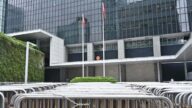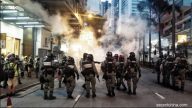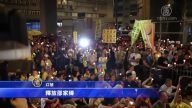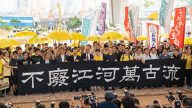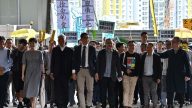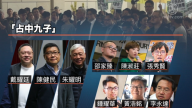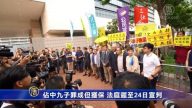【新唐人2014年10月01日訊】對於香港學生和市民持續多日的民主抗爭運動,有輿論認為,這場運動類似1989年北京學運再現,讓中共領導班子左右為難,既不能過於嚴厲打壓,又無法馬上結束。那麼北京將如何應對呢?下面讓我們看看專家的分析。
香港發起佔領中環行動,各界人士可謂一呼百應。警察雖然試圖強力驅離,不過越來越多的院校和各界民眾,仍持續湧入抗爭隊伍。
不少人想起25年前春夏之交的北京六四學運。儘管香港此次抗爭規模和波及範圍都有所不同,但學生的訴求與當局的對應,從實質上有著驚人的相似。
9月29號,英國廣播公司BBC中文網刊文「北京會否面對『香港的1989』」。文章提到,89年的學運,因北京當局動用坦克軍隊彈壓,嘎然而止。香港街頭抗議的學生,也讓那些曾經看到北京如何對付學生的人,感到擔心。
處於緊張狀態的香港,是否會觸發北京的暴力鎮壓呢?
紐約城市大學政治學教授夏明分析,中共當局一旦認為必要,完全有可能像25年前一樣,使用荷槍實彈對付抗議者。
紐約城市大學政治學教授夏明:「他們(中共高層)唯一的一個政治訴求,就是要維護今天的一黨專制,那麼在這種情況下,我覺得北京不惜採取最壞的打算,不應該超出目前北京已經發出的聲音和已經顯現的邏輯之外。」
但中國資深法學專家趙遠明認為,儘管北京一時態度強硬,也不太可能出現類似1989年那種大屠殺,因為北京一旦採取鎮壓措施,和平抗爭的香港學生會暫時退避。
中國資深法學專家趙遠明:「從習李政權看,對於佔中這個事態,應該是給他們逐漸的平息,然後合理的要求,應該給以答應或者解決,因為是爭取真正的普選,這是香港民眾的普遍心聲,而且這是合理合法合情的。」
北京駐港機構中聯辦28號發表聲明,譴責「佔領中環」是非法集會,並強硬指出,中共人大的決定「不容挑戰」;29號,中共喉舌《新華社》呼籲懲治所謂的「佔中」幕後元兇。
中國民主大學校長、前六四學生唐伯橋表示,香港學生和市民是世界上最理智、最和平的抗議群體之一,他們沒有向警察做出任何挑釁行為,香港政府卻反派防暴警察施暴,才會導致佔中行動遍地開花。
中國民主大學校長、前六四學生唐伯橋:「現在秩序很好,只是癱瘓了一部分交通,這次的佔中行動,本來之意就是要癱瘓交通,然後,逼迫香港當局和中共當局作出回應,兌現對全體香港人的承諾。」
29號,有外媒報導說,梁振英和中共港澳領導小組組長張德江等人,28號晚向北京當局提議要「武力鎮壓」佔中運動,但沒有獲得習近平的同意﹔29號,「環球時報」再次刊文鼓動派出武警鎮壓佔中,但文章很快被移除。
美國中文雜誌《中國事務》總編輯伍凡分析,在香港問題上,習近平和另一派系有分歧,那些提議「武力鎮壓」的人,是想藉機把習近平哄下臺。
美國中文雜誌《中國事務》總編輯伍凡:「這個事情不可能拖的很久了,我想最大的阻力來自於張德江,因為他是港澳小組組長,梁振英是馬仔,當然可以隨便換的,他不能左右大局,他也不掌握軍隊,他不能開槍。」
趙遠明認為,面對香港民眾抗暴的勇氣,以及全球的關注和各國政府的聲援,中共面臨著巨大的壓力和危機。但如果強力鎮壓,必將徹底癱瘓香港,毀掉香港。因此,他建議北京對香港的應對,讓香港局勢緩和的第一步,就是讓梁振英下臺。
How Will Beijing Handle “Hong Kong’s 1989″?
As the democratic protest in Hong Kong continues,
many compare it to the 1989 Beijing students’ movement.
Critics believe Beijing is faced with a dilemma; it can neither
harshly suppress the movement, nor end the protest.
How will the CCP handle the situation?
Let’s hear what the experts have to say.
The Occupy Central movement has won public popularity—
despite forceful tactics from the police, more people from
colleges and various sectors continue to join the protest.
It reminds many of the student movement in Beijing
25 years ago; although rather different in the scale and scope,
the students’ demands and the authorities’ responses
are surprisingly similar.
On Sept. 29, BBC Chinese questioned how Beijing will react
to “Hong Kong’s 1989″.
It mentioned that tanks had brought an end to the 1989
students’ protest in Beijing; people who had seen those scenes
are worried for Hong Kong’s students.
Will Hong Kong’s tension trigger violent repression
from Beijing?
Political science professor at City University of New York,
Xia Ming, believes that if the CCP considers it necessary,
using ammunition against the protesters is likely to happen,
just like it did 25 years ago.
Prof. Xia Ming: “The CCP’s only political aspiration is to
maintain its one-party dictatorship.In this case,
I think Beijing will resort to the worst scenario
to ensure its principle is not bent."
Senior legal expert Zhao Yuanming does not believe that
massacre as in 1989 will happen again, despite Beijing’s
tough stance, but says once Beijing resorts to repressive ways,
the peace-seeking students will temporarily retreat.
Zhao Yuanming: “From the perspective of Xi and Li’s regime,
they should allow the Occupy Central to subside gradually
and agree or resolve it by meeting reasonable demands.
The demand for universal suffrage is a general aspiration
of the Hong Kong people; it is legitimate and sensible."
Beijing’s Liaison Office in Hong Kong has condemned
the Occupy Central movement as illegal, and stresses that
the congress’ decision on the 28th is “unchallengeable".
CCP mouthpiece Xinhua also called to punish the so-called
“culprit" behind the Occupy Central movement.
Democracy Academy of China president Tang Baiqiao says
Hong Kong’s protest has been one of the most rational
and peaceful of demonstrations, and there has not been
any provocation towards the police.
The Hong Kong government dispatched the riot police
who have faced protesters with violence, but this has only
led to increased popularity for the Occupy Central movement.
Survivor of 1989 Tiananmen massacre, Tang Baiqiao:
“It’s in good order now; only part of the traffic was stopped.
The intention of the activity was to paralyze traffic
and force the Hong Kong authorities and the CCP to respond
and to fulfill their commitment to Hong Kong."
Foreign media reported on Sept. 29 that Leung Chun-ying
and Hong Kong and Macau affair leader Zhang Dejiang
had proposed on the 28th to suppress the protest with “force",
but this was not agreed by Xi Jinping.
State media also published an article encouraging suppression
by armed police; this was quickly removed from the Internet.
China affairs magazine editor-in-chief Chris Wu analyzes that
those who suggest to “suppress with force" are the ones who
have differences with Xi Jinping and who hope to remove Xi.
Chris Wu: “It can’t be dragged on for a long time;
I think Zhang Dejiang is the greatest resistance,
because he is Hong Kong and Macau’s affair leader.
Leung Chun-ying is just a messenger and he can be easily
replaced; he cannot control the overall situation
as he doesn’t hold the army, so he cannot open fire."
Zhao Yuanming believes the CCP is faced with a crisis
of tremendous pressure, due to the courage of the Hong Kong
people who are against violence, and due to concern
and solidarity from the international community.
He says strong repression will completely paralyze
and destroy Hong Kong, and therefore suggests that
Beijing have Leung Chun-ying step down,
as the first step in easing the situation in Hong Kong.


